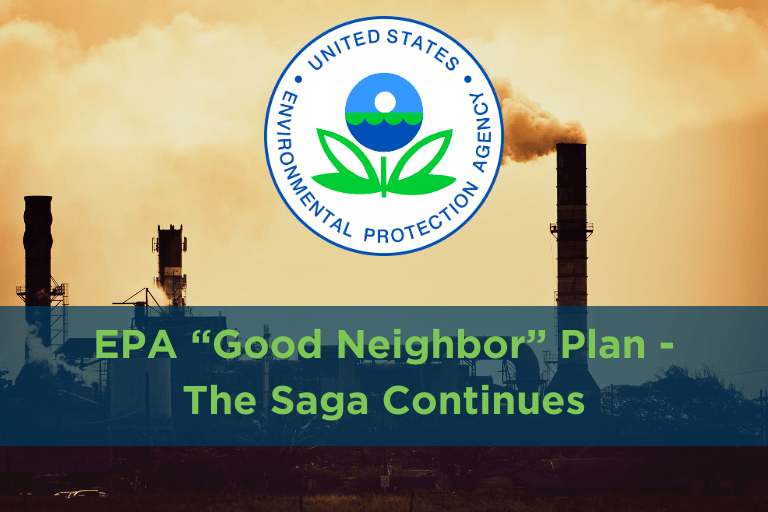What Do We Know Now?
In March 2023, The Environmental Protection Agency (EPA) first issued the Good Neighbor Plan (GNP), which is intended to secure reductions in ozone-forming emissions of nitrogen oxides (NOx) from power plants and industrial facilities. The GNP affected 23 states, of which 22 states were placed in a revised Group 3 trading program in 2023, and a daily backstop limit was applied to large coal-fired facilities with existing controls starting in 2024. In response to the regulation, many parties filed lawsuits, resulting in the removal of several states from the GNP in July and September 2023. In addition, some states were placed back in Group 2 trading programs, others were placed in a new Group 2 trading program, and some were removed entirely from all programs.
For more information on the GNP, read our previous blog post: The EPA’s Good Neighbor Plan – Response to Judicial Stays (escspectrum.com).
The Latest Update
The GNP continues to evolve. On January 16, 2024, EPA issued a proposed partial disapproval of five State Implementation Plans and replaced them with Federal Implementation Plans, adding five states – Arizona, Iowa, Kansas, New Mexico, and Tennessee – to the Group 3 program in 2025. The NOx backstop limits would apply to coal plants with controls starting in 2026 for these states. In addition, NOx emissions standards will apply to nine large industries in Arizona in 2027.
Also, in January 2024, it was announced that the Supreme Court would hear arguments to postpone the implementation of the GNP nationwide on February 21, 2024. In response to lawsuits filed, regional courts of appeals have stayed the GNP for several states, but the U.S. Court of Appeals for the D.C. Circuit declined to stay the GNP while litigation is pending. Therefore, the Supreme Court has agreed to hear the arguments. A ruling is expected in June 2024, which could stop the implementation of the GNP until litigation is settled.
What Do These Changes Mean?
- Depending on litigation and court rulings, some states (and their respective facilities) are in the GNP Group 3 training program; some are not.
- Facilities new to the program may need to modify their Data Acquisition Systems for emission reporting and new emission limits (e.g., NOx backstop for coal units.) in 2024 and/or 2026.
- Due to the uncertainty of the CSAPAR/GNP program, cost and future costs of allowances could be difficult to predict, making the cost of compliance difficult to predict. Accurate monitoring and reporting of emissions becomes more critical to the allowance program and cost of compliance.
Additional Resources:
- Good Neighbor Plan for 2015 Ozone NAAQS
- February oral argument scheduled for “good neighbor” pollution rule challenges
If you have any questions, feel free to contact Susan Kennedy at skennedy@escspectrum.com.
How can ESC Spectrum Help?
Understanding and addressing the changes in these regulations and how they affect your facility can be challenging – and they will likely change over time. ESC Spectrum has a full-time staff of reporting and regulatory experts on hard to help you. From assistance with Electronic Data Reports (EDRs), Permit Compliance Reports, and data review to help with Monitoring Plans, QA/QC plans, and audits of your Data Acquisition and CEM systems, we’ve got your back. If you have any questions about how the Good Neighbor Plan may affect your air emissions compliance, please contact our regulatory services team today.
Definitive Guide to Air Regulations: Interested in learning more about regulations and staying in compliance? Read our Definitive Guide to Air Emissions Regulations.

Susan Kennedy, QEP - Regulatory & Reporting Manager
Susan joins ESC Spectrum from the Power Industry sector where she spent 25+ years helping power plants and associated facilities comply with environmental laws and regulations. During her tenure at Progress Energy (now Duke Energy Florida) and Gulf Power Company, she supported various environmental programs covering all media. Her technical background includes permitting, compliance and reporting for wastewater, water use, groundwater, remediation, Title V, Title IV, CEMS, Green House Gas, Florida Annual Operating Reports, Air Testing, Reciprocal Internal Combustion Engine (RICE), Risk Management Plans and Toxic Release Inventory. She received both her Bachelor of Science (’92) and Master of Science (’96) degrees from Auburn University.


